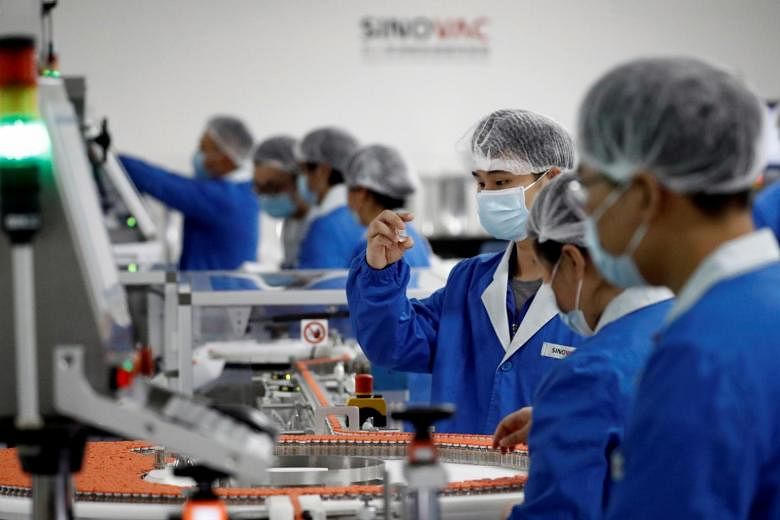China has been making moves to resurrect its international image and position itself as a key part of any global solution to Covid-19, as it continues with its vaccine development programmes.
On Oct 8, the country signed on to Covax, the World Health Organisation-backed initiative for the distribution of Covid-19 vaccines, joining 170 other nations.
Its move stood in contrast to Washington's refusal to join the global scheme, which it accused of having ties to organisations excessively influenced by Beijing.
On Monday, Chinese media reported that the state-owned Sinopharm Group had begun taking reservations for its Covid-19 vaccines, but this appeared not to be the case when the reservation portal was taken offline.
At a time when much of the world is still grappling with rising infection numbers, experts said, it was clear that Beijing was positioning itself to be key to any solution to the pandemic.
China's international image took a hit when the coronavirus first emerged in Wuhan last December.
Critics say Beijing mishandled the initial stages of the outbreak, which allowed the virus to spread worldwide, crippling economies through lockdowns and leaving over one million people dead so far.
But the country has been on a mission to reclaim the narrative on Covid-19 for some months now.
In May, Chinese President Xi Jinping pledged US$2 billion (S$2.72 billion) over the next two years to tackle Covid-19. Beijing has also offered access to its vaccines to other countries.
Foreign Ministry spokesman Hua Chunying said on Oct 9 that joining Covax was an "important measure", and China was fulfilling its promise to promote a vaccine as a global public good.
"This is a smart move to reassure the world that Beijing works with the international framework while the Trump administration does not, hopefully to counter the negative views of China that have arisen since earlier this year," said Professor Steve Tsang of the SOAS China Institute in London.
It could also strengthen Beijing's position among developing countries which do not have the resources to access vaccines and at which Covax is largely aimed.
Associate Professor Li Mingjiang of the S. Rajaratnam School of International Studies said joining Covax was "politically symbolic" and helps substantiate promises made by Beijing.
"We've already seen many Chinese policy announcements. Whenever a Chinese leader has a phone call with another country's political leader or when Chinese senior officials like (Foreign Minister) Wang Yi visit other countries, they've always mentioned China's willingness to provide vaccines or other support to foreign countries," said Prof Li.
China has 11 Covid-19 vaccines that are currently undergoing clinical trials, including four in the final phase of testing.
Two of those in Phase 3 testing belong to Sinopharm.
The group's chairman Yang Xiaoming said last month that development was moving faster than expected and the vaccines could be available before the end of the year.
They have already been approved for emergency use in the country and have been administered to medical workers and employees of state-owned companies.
But news that the company was willing to let the public book vaccine shots had sparked talk of a wider roll-out.
Chinese media reported on Monday that more than 90,000 people had applied to receive the virus shot through an applet on Chinese messaging app WeChat.
Following the reports, the applet was taken down.
Shanghai-based media outlet The Paper speculated that the company had been floating a test balloon to gauge public willingness to receive a vaccine.
But the rapid pace of China's vaccine development has sparked doubts over the robustness of Chinese testing, especially since other front runners, including Johnson & Johnson and AstraZeneca, have paused trials after participants came down with unexplained illnesses.
Despite these questions, Prof Tsang said, it is clear Beijing is determined to win the vaccine race.
"It clearly wants to be seen as the leading player for a solution to Covid-19," he said.


